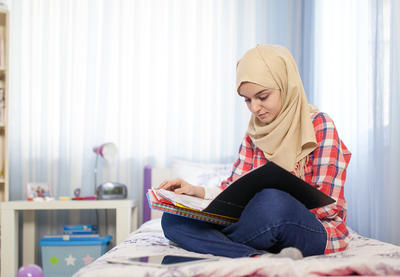Dear Educator,
Like you, I am anxious and stressed about what school closures mean for learners across the country. I know you are watching your phone for news and updates, thinking, This is unbelievable. I know you are wanting to be as helpful as possible, looking for the best resources to keep your students focused and engaged. I know you are wondering how long this will last.
But we can channel this energy toward productive struggle. I hope you will join me in seeing this as an opportunity to imagine the ways we can re-create equitable, engaging learning spaces as many of us venture into unfamiliar territory: teaching and learning from home.
First and foremost, let’s give ourselves and our students time to process this abrupt change. Remember that everyone is trying their best. And remember that long-term school closures are a drastic escalation to slow the spread of the novel coronavirus. In other words, rigorous, standards-based learning is taking a back seat to the health and longevity of all members of our intergenerational communities.
Schools and communities have already begun to rethink their responsibilities to students during this crisis. Many have organized grab-and-go meal kits for students and child care opportunities for families (in Washington, priority is given to students whose families are healthcare workers and first responders).
It is important that, as educators, we also think carefully about our responsibilities and prioritize the well-being of our students.
I am calling this a “healthy reminder” because I know you are compassionate toward learners who are most likely figuring out how to learn from home for the first time. I understand the desire and expectation for students to practice standards and learning targets so what they’ve learned is not forgotten. In addition, keeping youth academically engaged, despite our circumstances, has immeasurable benefits that will help students become informed, critical thinkers. I am not arguing these facts.
But there are other facts we must consider, as well. As you know, many of our learners do not have access to the internet or to a computer or mobile device. They may have to care for their younger siblings and family members while the adults in their household continue working out of necessity. Many of our students are Emerging Multilingual Learners and special education students. They require accommodations that educational technology platforms, online-only models or homework packets do not provide.
During this time of uncertainty and confusion, it is important that we remain united and connected. And this means recognizing that, right now, prioritizing the well-being of our students may mean deprioritizing learning goals. Now is a key time to see that any negative communication we send in an attempt to hold students accountable for completion of work has the potential to push students and their families even further away.
Instead of work that must be completed, the resources we’re sharing—whether an online-only model or a homework packet—can be understood as mentally engaging activities that can keep children happy as they practice physical distancing. This work can be part of a routine that includes time and space for academic learning and can help to create a resemblance of normalcy during these uncertain times.
Here is how you can start.
Do not worry about the loss of learning. Don’t worry about holding students accountable for the completion of activities, homework packets or online assessments while school is closed.
Share daily positive, encouraging feedback to students and their families.
Remind yourself every day that this is a stressful time for students and their families and that everyone is trying their best. We should only be concerned about their health and well-being. Do they have enough to eat? Do they need any other supplies as they manage city-wide shutdowns? Do their families need financial support?
Only offer opportunities to engage various learning styles. For example, email different ideas to create daily authentic learning experiences. If they were sent home with a math packet that helps them review fractions, ask them to provide an example of fractions in nature or in their home. This is a great way to encourage them to go for a walk or explore their surroundings. They can draw a picture of the example they found.
Use this opportunity to think deeply and reflect on your instructional practices, school policies and structures and how we can center the experiences of the global majority.
With so much love and gratitude for your service to the next generation,
A Fellow Educator


0 COMMENTS